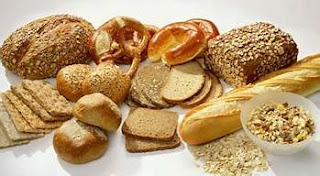Are whole grains really good?
When was the last time you ate whole grains or meals made from whole grains?
Do you like eating whole grains?
Numerous people do not fancy whole grain meals. But it's the best food ever!
I remember a certain time when I and my friends decided to bake cake with two sets of flour - whole wheat flour and refined wheat flour (regular confectionary flour).
You know what, the final products was awesome but almost everyone opted for the cake made from refined wheat flour.
The issue with consumption is, most of the time consumers try to satisfy the sensory organs without considering the health implications of such diet.
There are lots of health benefits associated with consuming whole grains and until one chooses whole grains over refined grains such benefits will not be obtained.
What are grains?
Grains are staple foods usually of cereal and legume families. They include; rice, wheat, peas, cowpeas, oat, corn among others.
Whole grains
Whole grains are grains that still have its germ, bran and endosperm. These components are rich in nutrients
Examples of whole grains are;
Whole wheat; whole-wheat breads
Oatmeal
Whole brown rice
Millet
Sorghum
Barley
Cowpeas
Peas
Peanuts
Rye
Popcorn among others.
Refined grains
Refined grains are those grains that have been processed into shelf stable product thereby losing most of the nutrients (iron an B vitamins).
Although some of the nutrients can be added back by fortification and enrichment but the insoluble fiber is generally lost.
Examples of refined grains
Meals made from grains which have had it outer coat, bran and germ removed.
Their examples are mostly bread, cakes, noodles, cookies and so on.
Foods made from whole grains
Most breakfast cereals are processed from refined grains instead of whole grains.
Whole grains can be used to process these foods:
Whole grain bread
Whole grain oats
Whole grains corn flakes
Whole grains rice and others.
RDA of whole grains
The recommended daily allowance of whole grains is a minimum of three and four ounces of whole grains for women and men respectively.
This is equivalent to consumption of 1 and ½ to 2 cups of brown rice and oatmeal per day.
Health benefits of whole grains
- Study has shown that consumption of whole grains promotes weight loss
Whole grains reduce the amount of calories stored in the body during digestion. This is because it passes through the digestive system undigested hence it is not stored in the body. Consumption of fiber rich foods increases the bulk of the food but decreases the quantity of starchy foods eaten.
According to the study, consumption of whole grains resulted to loss of about 100 calories due increased fecal loss and improved metabolic rate compared to consumers who ate refined grains.
- They improve the metabolism of the body
Metabolism is a process in the body system which involves the conversion of foods into energy.
Do you know high metabolic rate means your body system will function optimally?
Do you know a person with high metabolic rate tend to burn fat faster?
As one ages, the metabolic process tend to lower. It is recommended that one should make lifestyle changes in order to improve one's metabolic rate.
Consumption of fiber rich foods is one way to achieve this.
- They reduce the incidence of cardiovascular disease
There are two different types of fibers; soluble and insoluble fiber. While insoluble fiber is responsible for adding bulk to food, increasing bowels movement and weight reduction.
Soluble fiber is jellylike in solution. In small intestine, soluble fiber binds with LDL cholesterol (the bad cholesterol) and prevents it from entering the blood stream.
Soluble fiber takes this LDL cholesterol to large intestine where it is moved out of the body system.
- Whole grains protect against cancer especially gastric and colon cancers and other degenerative diseases.
Thus, it can be said that whole grains aid in weight loss, prevent
certain cancers.
People who eat whole grains that matched
the recommended daily allowance for fiber, loss close to 100 calories of weight.
This is because whole grains are rich in fiber which improves metabolic rate as
well as greater fecal losses; due to the effects it has on the digestibility of
other calories.
Protection against cancerous cells can
be attributed to the presence of antioxidants; phenolic compounds, carotenoid,
minerals; selenium and fiber.
For a healthy living, caution must be
applied when making choice of what to eat. It is recommended that more of whole
grains than refined grains be consumed since the former has higher nutritional
values than the latter.
Attempt these guidelines to put in more whole grains to your meals
and snacks:
- Include
whole-grains in bread, sandwiches and cakes.
- Relish
breakfasts that contain whole-grain cereals, such as whole-wheat bran
flakes.
- Replace
whole-wheat toast for plain wheat.
- Prepare
sandwiches using whole-grain breads or rolls.
- Substitute
white rice with brown rice.
Reference
Slavin J, Jacobs D
and Marquart L. (1997).Whole-grain consumption and chronic disease: protective
mechanisms.
Tufts University (2017). New study
suggests that eating whole grains increases metabolism and calorie loss.


Comments
Post a Comment